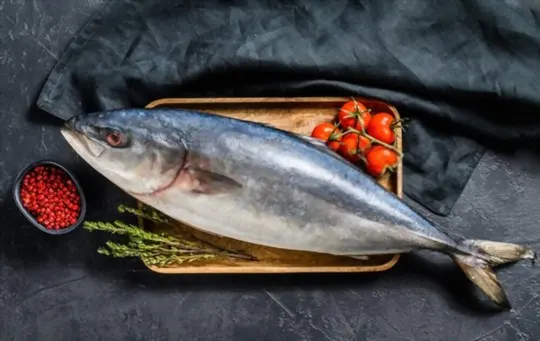If you are an avid fish eater, you probably have heard of amberjack.
But what does it actually taste like? Is it worth the hype?
To answer those questions and more, we have decided to create a comprehensive guide on everything there is to know about this diversely flavored fish.
From its texture to its taste, ambergack has all sorts of flavors that can take your taste buds for a wild ride!
So if you’re curious as to how amberjack tastes and why everyone seems so fascinated by it, then read on and find out!
What is Amberjack?

Amberjack is a fish that can be found in warm waters around the world.
At first glance, you may mistake it for a tuna or a jackfish, but this fish has a distinct golden-yellow color and golden lateral lines that make it stand out.
While it can be perplexing to identify, Amberjacks have a long and slender body, with a sharply pointed nose and a dorsal fin that runs the length of its body.
These fish are highly sought after by fishermen and are known for their firm, white, and succulent meat.
They are often used in culinary dishes and can be cooked in various ways, including grilling, baking, or frying.
The benefits of consuming Amberjack are numerous, as it is a rich source of protein, omega-3 fatty acids, and low in fat.
If you are a fan of fish, this is definitely a fish to try out on your next seafood dish.
What Does Amberjack Taste Like?

Amberjack is a type of fish found in warm waters around the world.
It’s known for its firm, meaty texture and rich, buttery flavor.
The taste of Amberjack has often been likened to that of tuna or mahi-mahi, with a mild, sweet flavor and a hint of nuttiness.
The texture of Amberjack is flaky, but it holds together well when cooked, making it ideal for grilling or roasting.
When cooked properly, Amberjack can melt in your mouth, providing a savory and satisfying meal.
It’s a versatile fish and can be used in a variety of dishes, including tacos, ceviche, and sushi.
When selecting Amberjack, look for fillets with a moist, glossy appearance and a mild, sweet smell.
This will ensure that you get the best flavor and texture when cooking it.
Factors that Affect the Taste of Amberjack
Amberjack is a type of fish primarily found in the Atlantic and Pacific oceans, which is known for its firm texture, mild flavor, and versatility in cooking various dishes.
The taste of amberjack can be influenced by several factors, including the age and size of the fish, the location where it was caught, and how it was cooked.
Younger amberjacks tend to have a milder flavor, whereas mature ones have a stronger taste.
In terms of texture, smaller amberjacks are often more tender and flaky, while larger ones can be dense and meaty.
The location where the fish was caught can also impact its taste, as the temperature and quality of water can vary from region to region.
Generally, amberjack from colder waters have a more delicate taste, while those from warmer waters have a more pronounced flavor.
Finally, the way it’s cooked, grilled or pan-seared, can make a big difference in the overall taste of the fish.
Pro Tip: To fully enjoy the taste of amberjack, it’s best to serve it with simple seasoning and minimal added flavors to allow its natural taste to shine through.
How to Cook Amberjack to Enhance its Flavor?

Amberjack is a game fish that is known for its firm and meaty texture, as well as its mild and sweet taste.
To enhance the flavor profile of amberjack, there are several cooking methods and flavor pairings to consider.
Here are some ideas:
- Grilling: Amberjack is an excellent fish for grilling, as it holds together well under high heat. Brush the fillets with olive oil and season with salt, pepper, and lemon juice before grilling.
- Baking: For a more delicate dish, bake amberjack fillets with butter, garlic, and white wine. Serve with a side of roasted vegetables, such as asparagus or cherry tomatoes.
- Pairings: Amberjack pairs well with bold flavors, such as citrus, garlic, and ginger. Alternatively, you can keep it simple by seasoning with salt, pepper, and herbs like thyme or parsley.
Pro tip: To prevent overcooking, check the internal temperature of the fish with a meat thermometer.
The ideal temperature for cooked fish is 145°F or 63°C.
Is Amberjack Healthy?
Amberjack is a highly nutritious saltwater fish species enjoyed by many food enthusiasts around the world.
It is a type of jackfish found in the Atlantic and Pacific oceans, known for its mild yet distinct taste.
The texture of amberjack is firm and meaty, making it highly versatile in cooking methods such as grilling, broiling, and baking.
Amberjack is a great source of protein, omega-3 fatty acids, and essential nutrients such as Vitamin D, potassium, and magnesium.
This fish is also low in fat and calories, making it an excellent addition to a healthy diet.
When cooked, amberjack has a sweet, mild flavor with buttery undertones.
The flesh is tender and flaky, making it an excellent option for sushi or sashimi.
Where to Buy Amberjack and How to Store It?

Amberjack is a type of fish that is commonly found in the Mediterranean Sea, the Atlantic Ocean, and the Gulf of Mexico.
It has a firm, meaty texture and a rich, buttery flavor that pairs well with a variety of seasonings and sauces.
When buying amberjack, it is important to purchase it from a reputable fishmonger or seafood market to ensure its quality and freshness.
Look for whole fish with bright, clear eyes, red gills, and shiny skin.
When it comes to storing amberjack, it is best to wrap it tightly in plastic wrap or place it in an airtight container and store it in the coldest part of your refrigerator for up to two days.
Alternatively, you can freeze amberjack for up to six months by wrapping it tightly in plastic wrap and placing it in a freezer-safe container.
Conclusion
In conclusion, Amberjack is a type of fish that’s commonly found in the Mediterranean Sea and North Atlantic Ocean.
It’s a prized food fish that’s highly sought after for its firm, meaty texture and mild, buttery taste.
Amberjack’s large size and flavor profile make it a popular choice for grilling, searing, or baking.
However, it’s important to note that Amberjack has a relatively high mercury content compared to other fish, so it’s recommended to consume it in moderation.
Overall, Amberjack’s flavor profile and versatility in the kitchen make it a favorite among seafood lovers.

What Does Amberjack Taste Like? A Comprehensive Guide
Ingredients
- Amberjack
- Ingredients from your selected recipes
Instructions
- Select ingredients that work well together.
- Use a recipe or method that will enhance their natural taste.
- Taste and adjust the recipe as needed to achieve the desired flavor.

Carrie is a food writer and editor with more than 15 years of experience. She has worked for some of the biggest names in the food industry, including Bon Appétit, Food & Wine, and Martha Stewart Living.
As the Editor in Chief of IntroChicago.com, Carrie oversees all of the content on the site. She also manages the team of contributing writers and editors, who help to create delicious recipes, helpful tips, and informative articles that you’ll find on the site.
A native of the Chicago area, Carrie is passionate about all things food. She loves trying new restaurants and experimenting with new recipes in her kitchen. She’s also a graduate of the Culinary Institute of America, so she knows a thing or two about food!
